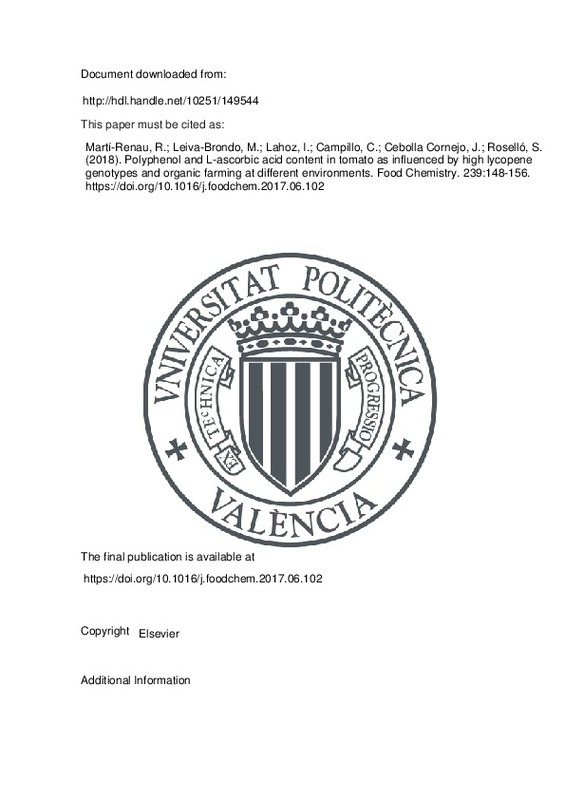JavaScript is disabled for your browser. Some features of this site may not work without it.
Buscar en RiuNet
Listar
Mi cuenta
Estadísticas
Ayuda RiuNet
Admin. UPV
Polyphenol and L-ascorbic acid content in tomato as influenced by high lycopene genotypes and organic farming at different environments
Mostrar el registro sencillo del ítem
Ficheros en el ítem
| dc.contributor.author | Martí-Renau, Raul
|
es_ES |
| dc.contributor.author | Leiva-Brondo, Miguel
|
es_ES |
| dc.contributor.author | Lahoz, Inmaculada
|
es_ES |
| dc.contributor.author | Campillo, Carlos
|
es_ES |
| dc.contributor.author | Cebolla Cornejo, Jaime
|
es_ES |
| dc.contributor.author | Roselló, Salvador
|
es_ES |
| dc.date.accessioned | 2020-09-08T03:32:08Z | |
| dc.date.available | 2020-09-08T03:32:08Z | |
| dc.date.issued | 2018-01-15 | es_ES |
| dc.identifier.issn | 0308-8146 | es_ES |
| dc.identifier.uri | http://hdl.handle.net/10251/149544 | |
| dc.description.abstract | [EN] The accumulation of polyphenols and L-ascorbic acid was evaluated under conventional (integrated pest management, IPM) and organic farming, as means to increase the accumulation of chemoprotective compounds. The effect of genotype was considerably higher than the growing system, in fact it is determining. 'Kalvert', a high-lycopene cultivar, outstood for the accumulation of most polyphenols, though low-carotenoid cultivars with high accumulation were also detected. Organic farming significantly increased the levels of caffeic acid by 20%, but reduced those of ferulic acid and naringenin by 13% and 15% respectively. A strong interaction with the environment was detected: in Navarra the differences were limited, while in Extremadura lower contents of ferulic acid and higher contents of chlorogenic acid and rutin were found in organic farming for certain cultivars. The effect of organic farming on L-ascorbic acid was dependent on cultivar and environment and it only led to an increase in Extremadura by 58%. (C) 2017 Elsevier Ltd. All rights reserved. | es_ES |
| dc.description.sponsorship | This research was partly funded by INIA (RTA2011-00062, Spain) and FEDER (EU). | es_ES |
| dc.language | Inglés | es_ES |
| dc.publisher | Elsevier | es_ES |
| dc.relation.ispartof | Food Chemistry | es_ES |
| dc.rights | Reconocimiento - No comercial - Sin obra derivada (by-nc-nd) | es_ES |
| dc.subject | Solanum lycopersicum L. | es_ES |
| dc.subject | Organic farming | es_ES |
| dc.subject | L-Ascorbic acid | es_ES |
| dc.subject | Functional quality | es_ES |
| dc.subject.classification | GENETICA | es_ES |
| dc.title | Polyphenol and L-ascorbic acid content in tomato as influenced by high lycopene genotypes and organic farming at different environments | es_ES |
| dc.type | Artículo | es_ES |
| dc.identifier.doi | 10.1016/j.foodchem.2017.06.102 | es_ES |
| dc.relation.projectID | info:eu-repo/grantAgreement/MICINN//RTA2011-00062-C04-02/ES/Optimización de la calidad organoléptica y funcional del tomate de industria. Selección de genotipos y técnicas de cultivo respetuosas con el medio ambiente/ | es_ES |
| dc.relation.projectID | info:eu-repo/grantAgreement/MICINN//RTA2011-00062-C04-01/ES/Optimización de la calidad organoléptica y funcional del tomate de industria. Selección de genotipos y técnicas de cultivo respetuosas con el medio ambiente/ | es_ES |
| dc.relation.projectID | info:eu-repo/grantAgreement/MICINN//RTA2011-00062-C04-03/ES/Optimización de la calidad organoléptica y funcional del tomate de industria. Selección de genotipos y técnicas de cultivo respetuosas con el medio ambiente (III)/ | es_ES |
| dc.relation.projectID | info:eu-repo/grantAgreement/MICINN//RTA2011-00062-C04-04/ES/Optimización de la calidad organoléptica y funcional del tomate de industria. Selección de genotipos y técnicas de cultivo respetuosas con el medio ambiente (IV)/ | es_ES |
| dc.rights.accessRights | Abierto | es_ES |
| dc.contributor.affiliation | Universitat Politècnica de València. Instituto Universitario de Conservación y Mejora de la Agrodiversidad Valenciana - Institut Universitari de Conservació i Millora de l'Agrodiversitat Valenciana | es_ES |
| dc.contributor.affiliation | Universitat Politècnica de València. Departamento de Biotecnología - Departament de Biotecnologia | es_ES |
| dc.description.bibliographicCitation | Martí-Renau, R.; Leiva-Brondo, M.; Lahoz, I.; Campillo, C.; Cebolla Cornejo, J.; Roselló, S. (2018). Polyphenol and L-ascorbic acid content in tomato as influenced by high lycopene genotypes and organic farming at different environments. Food Chemistry. 239:148-156. https://doi.org/10.1016/j.foodchem.2017.06.102 | es_ES |
| dc.description.accrualMethod | S | es_ES |
| dc.relation.publisherversion | https://doi.org/10.1016/j.foodchem.2017.06.102 | es_ES |
| dc.description.upvformatpinicio | 148 | es_ES |
| dc.description.upvformatpfin | 156 | es_ES |
| dc.type.version | info:eu-repo/semantics/publishedVersion | es_ES |
| dc.description.volume | 239 | es_ES |
| dc.identifier.pmid | 28873552 | es_ES |
| dc.relation.pasarela | S\339261 | es_ES |
| dc.contributor.funder | European Regional Development Fund | es_ES |
| dc.contributor.funder | Ministerio de Ciencia e Innovación | es_ES |







![[Cerrado]](/themes/UPV/images/candado.png)

